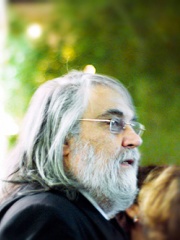
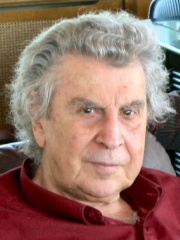

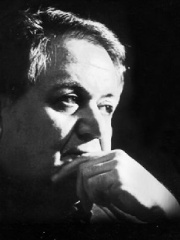
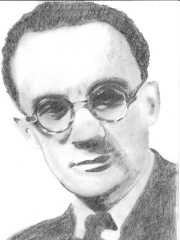
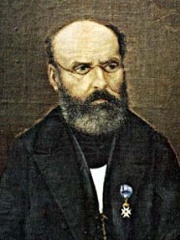
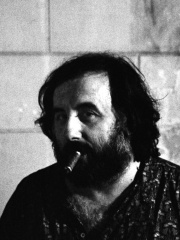

The Most Famous
COMPOSERS from Greece
Top 9
The following people are considered by Pantheon to be the most legendary Greek Composers of all time. This list of famous Greek Composers is sorted by HPI (Historical Popularity Index), a metric that aggregates information on a biography's online popularity.

1. Vangelis (1943 - 2022)
With an HPI of 77.87, Vangelis is the most famous Greek Composer. His biography has been translated into 70 different languages on wikipedia.
Evangelos Odysseas Papathanassiou (Greek: Ευάγγελος Οδυσσέας Παπαθανασίου, pronounced [eˈvaɲɟelos oðiˈseas papaθanaˈsi.u]; 29 March 1943 – 17 May 2022), known professionally as Vangelis ( vang-GHEL-iss; Greek: Βαγγέλης, pronounced [vaɲˈɟelis]), was a Greek musician, composer, and producer of electronic, progressive, ambient, and classical orchestral music. He composed the Academy Award-winning score to Chariots of Fire (1981), as well as scores for the films Blade Runner (1982), Missing (1982), Antarctica (1983), The Bounty (1984), 1492: Conquest of Paradise (1992), and Alexander (2004), and the 1980 PBS documentary series Cosmos: A Personal Voyage by Carl Sagan. Born in Agria and raised in Athens, Vangelis began his career in the 1960s as a member of the rock bands the Forminx and Aphrodite's Child; the latter's album 666 (1972) is recognised as a progressive-psychedelic rock classic. Vangelis settled in Paris and gained initial recognition for his scores to the Frédéric Rossif animal documentaries L'Apocalypse des Animaux, La Fête sauvage, and Opéra sauvage. He released his first solo albums during this time and performed as a solo artist. In 1975, Vangelis relocated to London, where he built his home recording facility named Nemo Studios and released a series of successful and influential albums for RCA Records, including Heaven and Hell (1975), Albedo 0.39 (1976), Spiral (1977), and China (1979). From 1979 to 1986, Vangelis performed in a duo with Yes vocalist Jon Anderson, releasing several albums as Jon and Vangelis. He collaborated with Irene Papas on two albums of Greek traditional and religious songs. Vangelis reached his commercial peak in the 1980s and 1990s. His score for Chariots of Fire (1981) won him an Academy Award for Best Original Score and the film's main theme, "Chariots of Fire – Titles,” went to number one on the U.S. Billboard Hot 100 chart, while his score for 1492: Conquest of Paradise (1992) was nominated for a Golden Globe Award for Best Original Score, and the film's soundtrack and main theme topped the European charts, selling millions of copies. His compilation albums Themes (1989), Portraits (So Long Ago, So Clear) (1996), and studio album Voices (1995) sold well. Vangelis composed the official anthem of the 2002 FIFA World Cup held in Korea and Japan. In his last 20 years, Vangelis collaborated with NASA and ESA on music projects Mythodea (1993), Rosetta (2016), and Juno to Jupiter (2021), his 23rd and final studio album. He died on 17 May 2022, at age 79, of heart failure at a hospital in Paris. Having had a career in music spanning over 50 years, and having composed and performed more than 50 albums, Vangelis is one of the most important figures in the history of electronic music and modern film music. He used many electronic instruments in the fashion of a "one-man quasi-classical orchestra," composing and performing on the first take.

2. Mikis Theodorakis (1925 - 2021)
With an HPI of 75.16, Mikis Theodorakis is the 2nd most famous Greek Composer. His biography has been translated into 57 different languages.
Michail "Mikis" Theodorakis (Greek: Μιχαήλ "Μίκης" Θεοδωράκης [mixaˈil ˈmicis θeoðoˈracis]; 29 July 1925 – 2 September 2021) was a Greek composer and lyricist credited with over 1,000 works. He scored for the films Zorba the Greek (1964), Z (1969), and Serpico (1973). He was a three-time BAFTA nominee, winning for Z. For the score in Serpico, he earned Grammy nominations. Furthermore, for the score to Zorba the Greek, with its song "Zorba's Dance", he was nominated for a Golden Globe. He composed the "Mauthausen Trilogy", also known as "The Ballad of Mauthausen", which has been described as the "most beautiful musical work ever written about the Holocaust" and possibly his best work. Up until his death, he was viewed as Greece's best-known living composer. He was awarded the Lenin Peace Prize. Politically, he was associated with the left because of his long-standing ties to the Communist Party of Greece (KKE). He was an MP for the KKE from 1981 to 1990. Despite this, however, he ran as an independent candidate within the centre-right New Democracy party in 1989, for the country to emerge from the political crisis created by the numerous scandals of the government of Andreas Papandreou. He helped establish a large coalition between conservatives, socialists and leftists. In 1990, he was elected to the parliament (as in 1964 and 1981), became a government minister under Konstantinos Mitsotakis, and fought against drugs and terrorism and in favor of culture and education. He continued to speak out in favour of leftist causes, Greek–Turkish–Cypriot relations, and against the War in Iraq. He was a key voice against the 1967–1974 Greek junta, which imprisoned him and banned his songs.

3. Eleni Karaindrou (b. 1941)
With an HPI of 62.97, Eleni Karaindrou is the 3rd most famous Greek Composer. Her biography has been translated into 22 different languages.
Eleni Karaindrou (Greek: Ελένη Καραΐνδρου; born 25 November 1939) is a Greek composer. She is best known for scoring the films of the Greek director Theo Angelopoulos.

4. Manos Hatzidakis (1925 - 1994)
With an HPI of 62.86, Manos Hatzidakis is the 4th most famous Greek Composer. His biography has been translated into 27 different languages.
Manos Hatzidakis (also spelled Hadjidakis; Greek: Μάνος Χατζιδάκις; 23 October 1925 – 15 June 1994) was a Greek composer and theorist of Greek music, widely regarded as one of the greatest Greek composers of all time. He was one of the main proponents of the "éntekhno" form of music, along with Mikis Theodorakis, and he is credited as the founder of the Orchestra of Colours, an ensemble performing lesser-known works and the music of Greek composers, and influenced a broad swathe of Greek culture through his writings and radio broadcasts. With his theoretical and compositional work, he is considered to be the first to connect post-war the worded music with traditional music. In 1960, Hatzidakis won an Academy Award for Best Original Song for "Never on Sunday" from the film Never on Sunday, but he refused the award because he felt that Athens was misrepresented in the film.
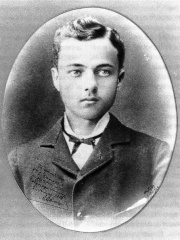
5. Spyridon Samaras (1861 - 1917)
With an HPI of 61.85, Spyridon Samaras is the 5th most famous Greek Composer. His biography has been translated into 23 different languages.
Spyridon-Filiskos Samaras (Greek: Σπυρίδων Σαμάρας; 29 November 1861 - 7 April 1917) was a Greek composer particularly admired for his operas. His compositions were praised worldwide during his lifetime and he is arguably the most important composer of the Ionian School. Among his best-known works are the operas Flora mirabilis (1886) and Mademoiselle de Belle-Isle (1905). He also composed the music for the Olympic Hymn.

6. Nikos Skalkottas (1904 - 1949)
With an HPI of 60.24, Nikos Skalkottas is the 6th most famous Greek Composer. His biography has been translated into 20 different languages.
Nikos Skalkottas (Greek: Νίκος Σκαλκώτας; 21 March 1904 – 19 September 1949) was a Greek composer of 20th-century classical music. A member of the Second Viennese School, he drew his influences from both the classical repertoire and the Greek tradition. He also produced a sizeable amount of tonal music in the last phase of his musical creativity.

7. Nikolaos Mantzaros (1795 - 1872)
With an HPI of 56.48, Nikolaos Mantzaros is the 7th most famous Greek Composer. His biography has been translated into 16 different languages.
Nikolaos Chalikiopoulos Mantzaros (Greek: Νικόλαος Χαλικιόπουλος Μάντζαρος [niˈkolaos xaliˈcopulos ˈmandzaros]; Italian: Niccoló Calichiopulo Manzaro; 26 October 1795 – 12 April 1872) was a Greek-Italian composer, born in Corfu. He was a major representative and founder of the so-called Ionian School of music (Επτανησιακή Σχολή). Recent research and performances have led to a re-evaluation of Mantzaros as a significant composer and music theorist.

8. Thanos Mikroutsikos (1947 - 2019)
With an HPI of 52.87, Thanos Mikroutsikos is the 8th most famous Greek Composer. His biography has been translated into 15 different languages.
Athanasios "Thanos" Mikroutsikos (Greek: Αθανάσιος (Θάνος) Μικρούτσικος; 13 April 1947 – 28 December 2019) was a Greek composer and politician. He is considered one of the most important composers of the recent Greek musical scene.

9. Andreas Makris (1930 - 2005)
With an HPI of 39.07, Andreas Makris is the 9th most famous Greek Composer. His biography has been translated into 5 different languages.
Andreas Makris (Greek: Ανδρέας Μακρής; March 7, 1930 – February 3, 2005) was a Greek-American composer and violinist, born in Kilkis, Greece, on March 7, 1930. He was a Composer-in-Residence for many years at the National Symphony Orchestra in Washington DC, working with conductors such as Howard Mitchell, Mstislav Rostropovich, Antal Dorati, and Leonard Slatkin. He composed around 100 works for orchestra, chamber ensembles, and solo instruments, including the Aegean Festival Overture, which, transcribed for concert band by Major Albert Bader of the USAF Band, became a popular piece with US bands. Grants and awards he received include the Damroch Grant, National Endowment for the Arts Grant, the Martha Baird Rockefeller Award, ASCAP Award, the Fulbright Scholarship, and citations from the Greek Government. Makris was a member of the first violin section of the National Symphony Orchestra for 28 years. He held previous positions in the Dallas Symphony Orchestra and the Saint Louis Symphony Orchestra. His compositions have been performed in USA, South America, Canada, Europe, Russia and Japan. He died on February 3, 2005, at his home in Silver Spring, MD. His legacy continues through the work of the Makris Foundation.
People
Pantheon has 9 people classified as Greek composers born between 1795 and 1947. Of these 9, 1 (11.11%) of them are still alive today. The most famous living Greek composers include Eleni Karaindrou. The most famous deceased Greek composers include Vangelis, Mikis Theodorakis, and Manos Hatzidakis.
Living Greek Composers
Go to all RankingsDeceased Greek Composers
Go to all RankingsVangelis
1943 - 2022
HPI: 77.87
Mikis Theodorakis
1925 - 2021
HPI: 75.16
Manos Hatzidakis
1925 - 1994
HPI: 62.86
Spyridon Samaras
1861 - 1917
HPI: 61.85
Nikos Skalkottas
1904 - 1949
HPI: 60.24
Nikolaos Mantzaros
1795 - 1872
HPI: 56.48
Thanos Mikroutsikos
1947 - 2019
HPI: 52.87
Andreas Makris
1930 - 2005
HPI: 39.07
Overlapping Lives
Which Composers were alive at the same time? This visualization shows the lifespans of the 8 most globally memorable Composers since 1700.

